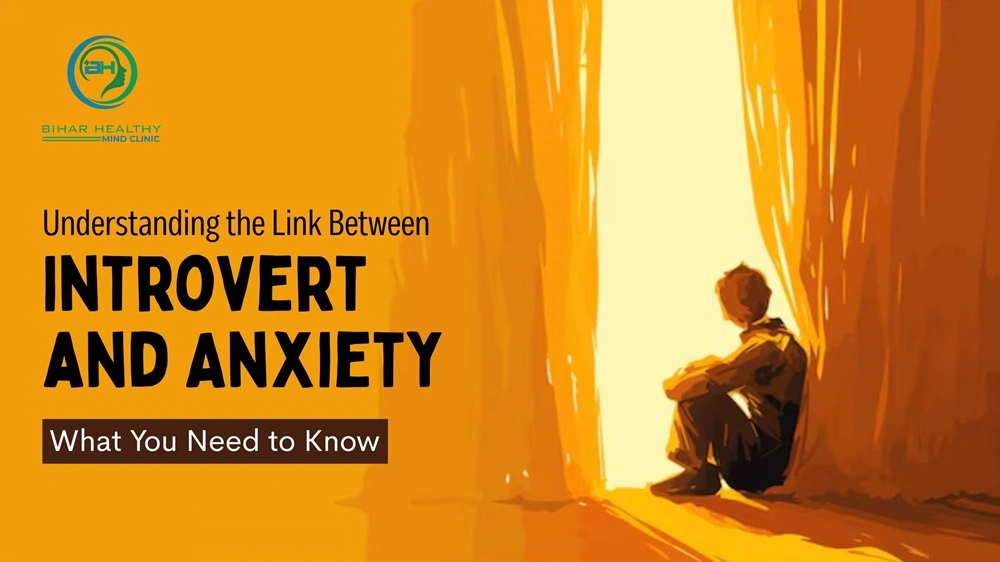
Every personality type experiences emotions differently, but introverts often face unique mental health challenges that may go unnoticed. One such concern is the connection between introvert and anxiety. Many people believe introverts are simply shy or socially reserved, but the reality is more complex. Introverts tend to process information deeply, reflect before responding, and recharge in solitude, these are the qualities that are healthy in themselves. However, when these traits combine with excessive worry or fear in social situations, anxiety can emerge.
At Patna Psychiatry, under the guidance of Dr. Saurabh Kumar, MD (Psychiatry), widely regarded as the best psychiatrist in Patna, individuals struggling with anxiety, whether introverted or not, receive expert diagnosis and evidence-based treatment designed to restore emotional balance and confidence.
Introversion vs. Anxiety: Understanding the Difference
Before delving deeper, it’s essential to differentiate between introversion and anxiety.
An introvert is someone who feels more energized in calm, low-stimulation environments. They prefer meaningful conversations over small talk and often enjoy time alone to recharge. In contrast, anxiety is a mental health condition characterized by excessive fear, nervousness, and overthinking that can interfere with daily functioning.
An introvert might decline social invitations simply because they prefer quiet time. However, a person with anxiety might avoid such events due to fear of judgment, embarrassment, or panic. The difference lies in motivation, introverts choose solitude for peace, while anxious individuals avoid social settings due to distress.
Why Introverts Are More Prone to Anxiety
While introversion itself is not a mental disorder, certain characteristics of introverts may make them more vulnerable to developing anxiety disorders. Some of the major reasons include:
Overthinking and Self-Criticism
Introverts tend to analyze situations deeply, often replaying conversations or worrying about what others think. This constant mental activity can easily turn into anxiety.
Sensitivity to External Stimuli
Crowded or noisy environments can overwhelm introverts, leading to stress or discomfort. Prolonged exposure to such situations can heighten anxiety levels.
Internalized Emotions
Many introverts find it difficult to express their emotions openly. Bottling up stress or frustration can lead to internal tension and emotional burnout.
Fear of Judgment
Some introverts may struggle with low self-esteem or fear being misunderstood, which can contribute to social anxiety.
Types of Anxiety Commonly Seen in Introverts
Introverts may experience a range of anxiety disorders, depending on their personality traits and coping mechanisms. The most common types include:
Social Anxiety Disorder
Fear of public speaking, social interactions, or being the center of attention. Introverts with this condition may avoid group settings, presentations, or even casual gatherings.
Generalized Anxiety Disorder (GAD)
Persistent, excessive worry about multiple aspects of life, including work, relationships, and personal goals.
Performance Anxiety
Fear or nervousness in situations where one is expected to perform or be evaluated, such as meetings or exams.
At Patna Psychiatry, patients with these conditions receive tailored therapy and medical management to help them manage symptoms effectively and lead fulfilling lives.
How Introverts Can Manage Anxiety
If you identify as an introvert struggling with anxiety, the good news is that it can be managed with the right approach. Here are some evidence-based strategies recommended by mental health professionals:
Acknowledge and Accept
Recognizing that anxiety is a treatable condition is the first step. Acceptance reduces shame and opens the door to healing.
Mindfulness and Relaxation Techniques
Meditation, deep breathing, or yoga can calm the mind and prevent overthinking.
Structured Social Exposure
Instead of avoiding all social interactions, gradually exposing yourself to manageable situations can build confidence and reduce anxiety triggers.
Journaling Thoughts
Writing down worries helps introverts process emotions instead of suppressing them.
Seeking Professional Help
Consulting an experienced psychiatrist or psychologist is crucial when anxiety affects daily life. At Patna Psychiatry, Dr. Saurabh Kumar provides compassionate, science-based care to help individuals overcome anxiety and regain control.
How Patna Psychiatry Helps Introverts with Anxiety
At Patna Psychiatry, treatment for anxiety in introverts is highly personalized. Dr. Saurabh Kumar, recognized as the best psychiatrist in Patna, uses a holistic approach combining psychotherapy, behavioral interventions, and when necessary, medication to address anxiety’s root causes.
-
Common treatment modalities include:
- Cognitive Behavioral Therapy (CBT): Helps individuals recognize and reframe negative thought patterns.
- Mindfulness-Based Therapy: Encourages presence in the moment and reduces overthinking.
- Lifestyle Counseling: Focuses on improving sleep, diet, and stress management.
Each treatment plan is designed considering the patient’s temperament, ensuring introverts feel understood and respected throughout their healing journey.
When to Seek Help
It’s normal for introverts to need downtime after socializing, but if anxiety starts to interfere with work, relationships, or well-being, it’s time to seek professional help. Persistent anxiety can lead to physical symptoms such as fatigue, headaches, or sleep disturbances issues that require medical attention.
Whether you’re an introvert trying to understand your emotions or someone supporting a loved one, remember that anxiety doesn’t define you. With the right guidance and care, you can lead a balanced and confident life.
Conclusion
If you or someone you know is struggling with anxiety, reach out to Patna Psychiatry today. Under the expert guidance of Dr. Saurabh Kumar, a trusted psychiatrist in Patna, comprehensive support is available to help you manage symptoms effectively and improve your quality of life.
Visitors: 98





No comments yet.